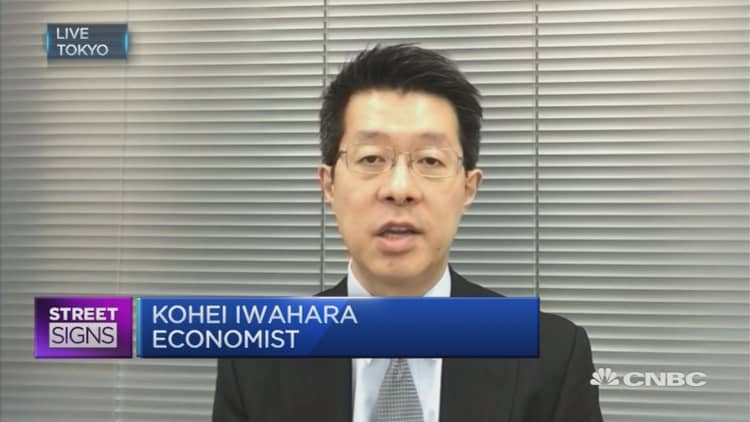After resigning from a start-up he sold to gaming company Zynga, Japanese tech CEO Shintaro Yamada spent six months backpacking abroad. When he returned to Japan, he founded a company that this year became Japan's first and only unicorn.
Backed entirely by Japanese venture capital, Mercari is now valued at more than $1 billion and is building an e-commerce empire in Japan to rival the likes of Amazon, eBay and domestic Japanese giants like Rakuten.
In just three years, the flea market app has raised 12.6 billion yen ($122 million based on Nov. 3 exchange rates) in funding, grown to 35 million downloads and now generates monthly sales of 10 billion yen ($97 million) and became a unicorn. Since becoming a unicorn, downloads of the start-up's app have increased from 30 million to 35 million in Japan.
Mercari, which also has offices in the U.S and the U.K., has seen U.S. downloads jump to 20 million, doubling since March. The start-up says it is focusing on the No. 1 economy, where it has been charging 10 percent commissions on sold items since Oct. 19. A Mercari spokesperson said its U.S. earnings have risen sixfold since 2015, though it declined to be more specific.
A bridge between Silicon Valley and Japan
Mercari is doing more than just raise money — it's becoming the poster child for Japan's emerging start-up class and and a maverick that defies traditional Japanese corporate culture and continues to attract more investors. It's youthfulness and investment strength also provides a stark contrast to a national economy defined by a rapidly aging population and high public debt, both of which still lack effective policy solutions.
High above the Tokyo's fashionably grungy Shibuya alleyways and Roppongi's party-weary streets, brightly-colored helium balloons fill the air over desks in the offices of the e-commerce darling. The balloons are not to celebrate the company's unicorn status. Nor are they to proclaim the continuing rise in domestic investment. They are "welcome" decorations, each bearing the name of a new recruit. In the six months through the March, Mercari's staff increased from 100 to 150. The company also has 120 members based in Sendai, a northeastern Japanese city struck by the massive earthquake and tsunami of 2011.
Where there is more than 1 unicorn
There are 174 non-listed start-ups valued at over $1 billion with a cumulative value of $626 billion. Here are the countries with more than one:
96 — United States
37 — China
8 — India
6 — U.K.
4 — Germany
3 — South Korea
2 — Singapore
2 — France
2 — Sweden
2 — Israel
2 — Canada
Source: CB Insights
Investment from major Japan VC funds, including East Ventures, Global Brain Corp., Globis Capital Partners, app-developer United Inc. and World Innovation Lab (WIL), helped spur Mercari's rapid growth.
One of those investors, World Innovation Lab, is one of Japan's larger VC funds with a pool of some $340 million. It wants to be a bridge between Japan and the U.S., investing in both, as well as finding ways to bridge Japan's technology old guard with emerging start-ups.
The fund was launched in 2013. Co-founder and CEO Gen Isayama is a former banker and has over 10 years of venture capital experience in Silicon Valley. The CEO is well-known among Japanese entrepreneurs as a venture mentor. He raised money from major Japanese corporations, including Sony, NTT Docomo, Mizuho and Nissan, and is pursuing a strategy of gaining access to the patents and technology databases of his donor corporations — some of Japan's biggest spenders on research and development — to search for marketable ideas.
But he gets most excited when talking about Mercari — specifically the lack of respect it has garnered from big-name investors.
"Why weren't Tiger Global, Fidelity, even Sequoia Growth Fund, Andreessen Horowitz ... why didn't they invest?" asked Isayama about the absence of major Californian VC funds in Mercari's billion-dollar valuation round. "It's a great company. If you compare it to any of the unicorns in the U.S., I think this company is 10 times better, healthier financially."
WIL invested an undisclosed sum in Mercari during the start-up's Series C round.
"It's good for them; it's also good for us," Yamada said with a laugh. "Before that, we were a little bit small."
Mercari used some of the investment to advertise on TV, a medium still widely adored by many Japanese. After the TV spots aired, Mercari's download numbers shot up.
Prime Minister Shinzo Abe has been a vocal supporter of Japan's venture ecosystem.
The International Monetary Fund reported this June that Japan is expected to grow at a .05 percent clip before dropping to 0.3 percent in 2017 due an anticipated consumption tax hike in coming years. The last such increase, in 2014, the first in some 20 years, caused the economy to contract into recession.
The Japanese leader hopes to spark an entrepreneurial revolution to stimulate the stagnant economy. He became the first sitting Japanese leader to officially visit Silicon Valley in 2015, where he announced his "Bridge of innovation between Silicon Valley and Japan" initiative.
The initiative includes plans to send some 200 of Japan's most promising start-ups to Silicon Valley over a five year-period for intense mentoring.
The government will also move to foster specialized conferences bringing together technology experts from different sectors in Japan and the U.S. as well as collaborations with cutting-edge, inter-discplinary centers of research at Stanford University.
The push by Japan to absorb the creative, disruptive and risk-taking culture of Silicon Valley is paying off.
Tokyo-based aerospace start-up, Axelspace, which created the first private microsatellite put in space, reeled in $15.8 million in Series A funding. Its new constellation project will help mine big data from around Earth, especially the environment.
Preferred Networks (PFN), a machine learning company specializing in production-line robots and self-driving devices, received 1 billion yen ($9.7 million) investment from Toyota and 900 million yen ($8.7 million) from industrial robot maker Fanuc.

"It's the biggest start-up market no one pays attention to," said Dave McClure, managing partner of 500 Startups, after meeting in Tokyo during a Geeks On A Plane tour through Asia.
Many of Japan's start-up CEOs and investors spoken to credited Prime Minister Abe's leadership for the current positive venture zeitgeist. However, VEC President Ryuji Ichikawa noted in a conversation with CNBC that Japan's VC firms, on the whole, remain secretive about their funds, funding and activities. One billionaire CEO of a VC fund agreed to talk to CNBC, but the chief growth officer blocked the meeting.
The Venture Enterprise Center Japan (VEC) — an extra governmental organization associated with the Ministry of Economy, Trade and Industry — reported on Sept. 1 that some 49.6 billion yen ($481 million) was sunk into domestic ventures by Japanese VCs in the first half of 2016.
That represented a 38 percent increase compared to the first half of 2015, which was a peak year in recent Japanese start-up investment since the VEC began collecting data in 2012. Twenty new VC funds opened in the first half of 2016 with a total value of 87.2 billion yen ($847 million), 29 percent more capital than those opened in the first half of 2015. Insurance companies accounted for 71.3 percent of contributions to the new funds.
Nations with a lone unicorn
Here are the 10 lone-unicorn nations and their unicorn companies:
Netherlands (Adyen)
Scotland (Skyscanner)
Swizerland (Mindmaze)
Nigeria (Africa Internet Group)
United Arab Emirates (Souq)
Indonesia (Go-Jek)
Luxembourg (Global Fashion Group)
Czech Republic (Avast Software)
Argentina (Decolar)
Japan (Mercari)
Source: CB Insights
As all of this money pours into Japanese start-ups, government stimulus strategies include increased funding for start-ups, starting the Nippon Venture Awards, introducing tax breaks for early state investors, and revising laws to spur the government and public agencies to offer contracts to new businesses.
The Japan Finance Corporation (JFC) extended 167,952 loans to start-ups between 2008 and 2015, according to Noriyuki Takahashi, head of Global Entrepreneur Monitor Japan. Interest rates on loans vary depending on the year and contract, but the JFC's current standard rate for ventures is 2.35 percent.
Since 2011, the JFC has granted 830.5 billion yen ($8 billion) in loans to new Japanese enterprises, during the same period VEC figures have Japan's VC funds as investing some 330.2 billion yen ($3.17 billion) into domestic ventures.
It's the biggest start-up market no one pays attention to.Dave McCluremanaging partner of 500 Startups
Silicon Valley's absence from the Mercari investor syndicate represents the general view of Japan from the U.S., according to Isayama. He also hears that his U.S. peers are too busy with China and India to bother with Japan.
Having worked in a Silicon Valley VC for many years, he said that unless people in the Valley have some kind of personal affinity for or relationship with Japan they are not interested in it.
More from Global Investing Hot Spots:
Brexit morass is creating a stock buying opportunity
US losing billion-dollar gold rush for Iranian oil
Despite election chaos, CEOs keeping cool: Survey
500 Startups has wanted to increase its activity in Japan for years. The Californian firm invested in "over a thousand" start-ups in the country before launching its Tokyo office in late 2015, 500 Startups Japan, currently a $30 million fund. Japanese investments made by 500 Startups include web-based human translation platform Gengo, mobility device maker Whill, Japan pop culture service TokyoOtakuMode and online shopping aid Paidy, said McClure.
While Mercari is going after eBay and Amazon on their home turf, it still remains to be seen whether Japanese investments can help spur success abroad, something that has eluded domestic e-commerce giant Rakuten. McClure is concerned that Japanese start-ups are too focused on "going global" and not paying enough attention to basic Japan-oriented online businesses that make money.
"A big online economy, lots of consumer spending, but still small amount of entrepreneur and investor activity relative to size of opportunity," he said.
—Julian Littler, special to CNBC.com




